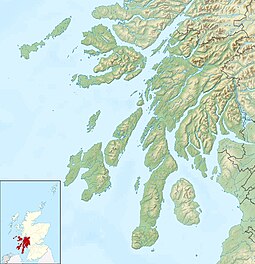Isle of Islay
| Gaelic name | |
|---|---|
| Norse name | Íl |
| Meaning of name | Unknown |
| Location | |
|
Islay shown within Argyll and Bute
|
|
| OS grid reference | NR370598 |
| Coordinates | 55°46′N 6°09′W / 55.77°N 6.15°W |
| Physical geography | |
| Island group | Islay |
| Area | 61,956 hectares (239 sq mi) |
| Area rank | 5 |
| Highest elevation | Beinn Bheigeir 491 metres (1,611 ft) |
| Administration | |
| Sovereign state | United Kingdom |
| Country | Scotland |
| Council area | Argyll and Bute |
| Demographics | |
| Population | 3,228 |
| Population rank | 7 |
| Population density | 5.2 people/km2 |
| Largest settlement | Port Ellen |
Islay (![]() i/ˈaɪlə/ EYE-lə; Scottish Gaelic: Ìle, pronounced [ˈiːlə]) is the southernmost island of the Inner Hebrides of Scotland. Known as "The Queen of the Hebrides", it lies in Argyll just south west of Jura and around 40 kilometres (25 mi) north of the Irish coast. The island's capital is Bowmore where the distinctive round Kilarrow Parish Church and a distillery are located.Port Ellen is the main port.
i/ˈaɪlə/ EYE-lə; Scottish Gaelic: Ìle, pronounced [ˈiːlə]) is the southernmost island of the Inner Hebrides of Scotland. Known as "The Queen of the Hebrides", it lies in Argyll just south west of Jura and around 40 kilometres (25 mi) north of the Irish coast. The island's capital is Bowmore where the distinctive round Kilarrow Parish Church and a distillery are located.Port Ellen is the main port.
Islay is the fifth-largest Scottish island and the seventh-largest island surrounding Great Britain, with a total area of almost 620 square kilometres (239 sq mi). There is ample evidence of the prehistoric settlement of Islay and the first written reference may have come in the 1st century AD. The island had become part of the Gaelic Kingdom of Dál Riata during the Early Middle Ages before being absorbed into the Norse Kingdom of the Isles. The later medieval period marked a "cultural high point" with the transfer of the Hebrides to the Kingdom of Scotland and the emergence of the Clan Donald Lordship of the Isles, originally centred at Finlaggan. During the 17th century the Clan Donald star waned, but improvements to agriculture and transport led to a rising population, which peaked in the mid-19th century. This was followed by substantial forced displacements and declining resident numbers.
...
Wikipedia

